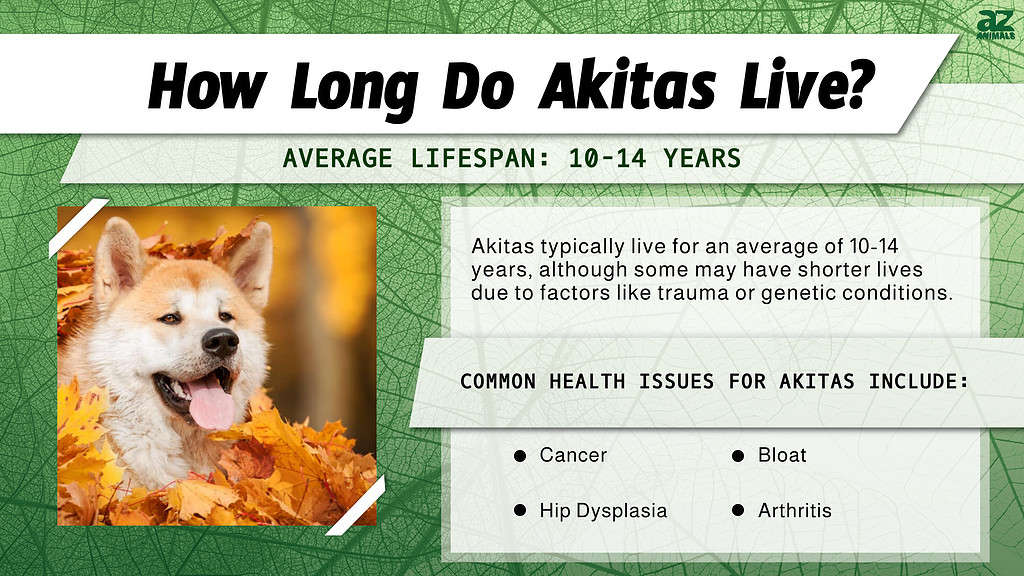
Akitas live 10-14 years on average. Some dogs die young due to trauma or genetic conditions, while some Akitas will live well into their teens! Akitas most commonly die of cancer, bloat, and musculoskeletal conditions like hip dysplasia and arthritis.
In this article, we’ll talk about how long Akitas live, their life cycle from puppies to senior dogs, what Akitas commonly die of, and more.

Akitas live an average of 10-14 years.
©Rita_Kochmarjova/Shutterstock.com
How Long do Akitas Live?
On average, Akitas live 10-14 years. This is a good lifespan for such a large dog!
Large dogs tend to have shorter lives than small dogs, who usually live longer. At 70-130 pounds, Akitas are very big dogs.
Spayed female Akitas live longest, while intact females have the shortest lifespans. Males are in the middle, with neutered male Akitas living longer than intact males.
Akita Life Cycle

Akitas are considered seniors at seven to nine years old.
©Liudmila Bohush/Shutterstock.com
An Akita’s life cycle starts in puppyhood and ends in their senior years. Let’s talk about each life stage and what to expect.
Puppies
When they’re first born, Akitas will depend on their mothers (or a human foster) for everything, even going potty. Their mother licks their private areas after each feeding. If the puppy is an orphan, a human must stimulate them to pee and poop using a warm, damp cloth.
Over the first few weeks, puppies will open their eyes and ears, learn to walk, and so much more! Most Akita puppies are adopted into their forever homes between eight to twelve weeks of age.
Akita puppies can be rambunctious, destructive, and sometimes annoying! Like human babies, they need a lot of attention and hands-on activity. It’s important to have patience and never resort to punishing your dog or using aversive training techniques.
They also need a lot of training, from manners to socialization. Socializing your Akita, or introducing them to a variety of new things, while they’re young sets them up to be a well-adjusted, confident adult dog.
Other things to think about in the puppy years are vet check-ups and puppy vaccines.
Adults
Akitas reach their full height at ten months to one year old and their full weight by two years old. Once they reach adulthood, spaying or neutering your Akita is very important. Talk to your veterinarian about the best time to schedule the surgery.
Adult Akitas will slowly lose their puppy energy and typically behave better. They have greater impulse control as adults, and you’ll also see the impacts of their training.
However, adult Akitas are still energetic dogs that require daily walks and play.
Seniors
Akitas are considered senior dogs at around seven to nine years old. As they enter their senior years, you might notice them slowing down and wanting to spend more time lounging around the house.
Every dog is different, so it’s important to follow your Akita’s lead. Pay attention to them during exercise: are they moving slower than usual, panting or drooling excessively, or otherwise looking tired?
Dogs love their routines, and it’s important to keep them as similar as possible. But if your Akita needs to slow down, try shortening your daily walk or even splitting it into two shorter, slower ones.
It’s also important to keep an eye on our senior pups for signs of illness, as they’re more likely to get sick as they age. If you notice any symptoms or changes in behavior, schedule an appointment with your veterinarian.

The most common cause of death in Akitas is cancer.
©Kseniia Kolesnikova/Shutterstock.com
What do Akitas Typically Die From?
Cancer is the leading cause of death in older dogs. Therefore, this is what your Akita is most likely to die from if they reach old age.
In young dogs, causes of death include trauma, infection, or congenital diseases.
As large dogs, Akitas are also likely to develop musculoskeletal problems, including hip and elbow dysplasia and arthritis.
Lastly, it’s important to know the signs of GDV, also known as bloat, before adopting a large, deep-chested breed like an Akita. Bloat is an emergent, deadly disease that kills 30% of impacted dogs, even with the best veterinary care.
Spotting the signs early and rushing your dog to an emergency vet clinic will give them the best chances of survival.
Symptoms of bloat include:
- Swollen abdomen
- Retching
- Restlessness
- Excessive drooling
- Abdominal pain
- Shock
- Increased heart rate
- Weak pulse
You can also lessen the chances of your Akita developing bloat by doing the following:
- Avoiding raised feeding bowls
- Using slow-feeder bowls that sit directly on the ground
- Feeding multiple small meals a day rather than one large meal
- Feeding canned food instead of dry
- Not moistening dry food, especially if it contains citric acid as a preservative
- Keeping their environment low stress, especially during mealtimes
- Feeding the right amount of food daily to keep your Akita at a healthy weight (not too thin or too fat)
- Avoiding exercise too soon before or after meals or before and after your Akita drinks large amounts of water

Factors that can increase an Akita’s lifespan include genetics, diet, exercise, and veterinary care.
©otsphoto/Shutterstock.com
How to Increase Your Akita’s Lifespan
There are several ways to increase your Akita’s lifespan. Although we can’t control how long our dogs live, the following will give them the best chance at a long life.
Buy From a Reputable Breeder (Or Rescue!)
Sometimes we don’t get to choose our dog’s genetic history. As someone who always rescues my dogs, I would never discourage it!
However, rescue dogs have unknown genetics and are often poorly bred. If you are buying an Akita puppy from a breeder, it’s important to shop with someone who does their due diligence in not passing down genetic health problems to puppies.
They should run all recommended genetic health tests and publish them for the public to see. Breeders shouldn’t breed Akitas with histories of bloat, as the puppies will then have an increased risk.
Bring them to the Veterinarian Regularly
Your Akita has less chance of developing common diseases if they are vaccinated as a puppy and receive boosters throughout their lifetime as recommended by your vet.
Young Akitas should receive a veterinary check-up at least once a year and seniors every six months.
If you notice anything amiss, such as symptoms of illness or changes in behavior, call your veterinarian to schedule an appointment.
In an emergent situation, such as if your dog shows symptoms of bloat, don’t wait–bring them to your nearest emergency vet clinic right away.
Feed them a Veterinarian-Recommended Diet
Feeding the right diet can go a long way to make your Akita’s lifespan longer.
However, there are a lot of false marketing and scare tactics out there surrounding dog food. It can be difficult to know what to feed your Akita when everyone’s saying different things!
This is why I only listen to veterinarians in regard to my pets’ diet and health. Some people believe vets push foods to make money–but most vets don’t even carry food outside of prescription diets or stock very little of it for their clients’ convenience.
Trendy dog foods like grain-free or raw diets are not recommended by veterinarians or the Veterinary Medical Association (AVMA). Grain-free dog foods are being studied by the FDA for a potential link to a heart condition called DCM, as are some boutique brands and unusual meat ingredients such as duck and kangaroo. Raw meat can make your pets and your human family sick.
Provide Regular Exercise
Akitas need at least one walk or run daily, alongside plenty of playtime at home. Too little exercise can cause weight gain, health problems, and behavioral problems.
Avoid exercise directly before or after a large meal or a large amount of water, though, to reduce your pup’s risk of bloat.
Akitas live 10-14 years on average, and with this information, I hope your pup can make it to 14 and beyond! Remember that senior Akitas typically die from cancer, bloat, or musculoskeletal disorders.
Genetics, veterinary care, and daily pet care are the most important factors that determine an Akita’s lifespan.
The photo featured at the top of this post is © Eve Photography/Shutterstock.com
Ready to discover the top 10 cutest dog breeds in the entire world?
How about the fastest dogs, the largest dogs and those that are -- quite frankly -- just the kindest dogs on the planet? Each day, AZ Animals sends out lists just like this to our thousands of email subscribers. And the best part? It's FREE. Join today by entering your email below.
Thank you for reading! Have some feedback for us? Contact the AZ Animals editorial team.






